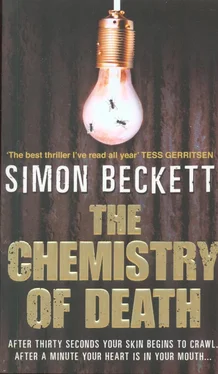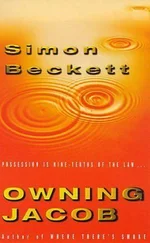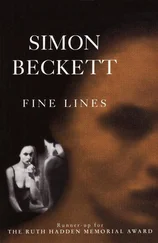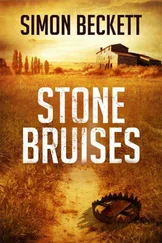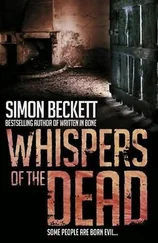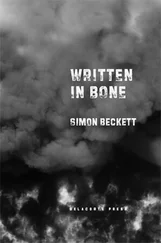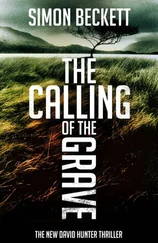Simon Beckett - The Chemistry of Death
Здесь есть возможность читать онлайн «Simon Beckett - The Chemistry of Death» весь текст электронной книги совершенно бесплатно (целиком полную версию без сокращений). В некоторых случаях можно слушать аудио, скачать через торрент в формате fb2 и присутствует краткое содержание. Жанр: Триллер, на английском языке. Описание произведения, (предисловие) а так же отзывы посетителей доступны на портале библиотеки ЛибКат.
- Название:The Chemistry of Death
- Автор:
- Жанр:
- Год:неизвестен
- ISBN:нет данных
- Рейтинг книги:5 / 5. Голосов: 1
-
Избранное:Добавить в избранное
- Отзывы:
-
Ваша оценка:
- 100
- 1
- 2
- 3
- 4
- 5
The Chemistry of Death: краткое содержание, описание и аннотация
Предлагаем к чтению аннотацию, описание, краткое содержание или предисловие (зависит от того, что написал сам автор книги «The Chemistry of Death»). Если вы не нашли необходимую информацию о книге — напишите в комментариях, мы постараемся отыскать её.
The Chemistry of Death — читать онлайн бесплатно полную книгу (весь текст) целиком
Ниже представлен текст книги, разбитый по страницам. Система сохранения места последней прочитанной страницы, позволяет с удобством читать онлайн бесплатно книгу «The Chemistry of Death», без необходимости каждый раз заново искать на чём Вы остановились. Поставьте закладку, и сможете в любой момент перейти на страницу, на которой закончили чтение.
Интервал:
Закладка:
I'd spent the previous afternoon and part of the evening working on the young man's remains, and while we'd have to wait for tests on the adipocere in the soil samples to get an accurate time-since-death estimate, I didn't expect any surprises. The good news, if it could be called that, was that it shouldn't be too hard putting a name to the victim. His teeth were intact, complete with fillings, so with luck a match with dental records would provide an ID. I'd also found an old fracture on his left tibia. The shin bone was long healed, but it was another feature that would help establish his identity.
Other than that, all I'd been able to do was confirm what I'd told Mackenzie earlier. The grave's occupant was a young white male in his late teens or early twenties whose skull had been crushed by something blunt and heavy. Probably a large hammer or mallet, given the round, radial shape of the holes punched through the bone. The position and amount of damage suggested he'd been struck repeatedly from behind. It was impossible to say for certain after all this time if that had actually killed him, but my guess would be that it had. An injury like that would have been almost instantly fatal, and while there was no way of knowing now what else might have been done to him beforehand, his bones at least bore no other sign of violence.
There was no reason to think this death had anything to do with the current events in Manham. Our killer was targeting women, not men, and although we wouldn't know for sure until the remains had been identified, it was doubtful this victim was local. The village wasn't big enough to hide a disappearance for all this time. More to the point, the murder bore no similarity to Sally Palmer's. She had been left in the open, not buried, and while the bones of her face had been shattered, either from rage or to conceal her identity, the young man's remained untouched. The likeliest scenario was that both he and his killer were from somewhere else, and that the body had simply been brought out into the wilds to be disposed of.
Even so, I'd spent more time than I could probably justify checking that its cervical vertebrae were unmarked. Perhaps it was just the fact that, until a week ago, the only thing outstanding about Manham was its isolation. Now there were two murders, one recent, one not, and a young woman was missing. It was hard not to feel a sense of unravelling. If the village was only now starting to give up its secrets, there was no telling what else might be unearthed before this was done.
It wasn't a comforting thought.
I flipped through the rest of the newspaper, but without much interest. I tossed it onto the table and finished the last of my coffee. Time for a shower, and then I'd have to head over to Henry's for Sunday lunch.
The thought of seeing Jenny afterwards made me feel both nervous and excited. And a little guilty, because I hadn't had a chance to tell Henry about it. He wouldn't mind us borrowing the dinghy, but I knew he'd be expecting me to stay for the rest of the afternoon, and I felt bad that I'd have to cut and run. Perhaps I should have rescheduled one or the other. But I didn't like letting him down, and I'd no idea how long it would be before I'd be able to take the dinghy out again. I didn't want to wait.
Why not? a cynical voice chimed in my head. Are you really so keen to see Jenny again? But that wasn't something I chose to think about. So I got up to take a shower, leaving the question hanging unanswered.
A nagging tension headache had developed by the time I reached Henry's. But it wasn't so bad that I didn't appreciate the smell of roast beef as I walked into the house. As usual I didn't knock, just called out as I went in.
'Through here,' Henry's voice came back from the kitchen.
I went through. The kitchen was hot even though the door was open, giving a view onto the secluded back lawn. Henry was whipping batter in a dish for Yorkshire puddings, an empty wine glass close to hand. Not ideal fare for a hot afternoon, perhaps, but Henry was a traditionalist when it came to Sunday lunch.
'Nearly ready,' he said, spooning the batter into a baking tray. The hot fat hissed and sizzled. 'Soon as these are done we can eat.'
'Can I do anything?'
'Pour us both some wine. I've already started some plonk, or there's a bottle of decent stuff I've opened to breathe. Should be OK now. Unless you'd rather have a beer?'
'Wine's fine.'
He was already wheeling himself over to the oven. He opened the door, recoiling a little from the blast of heat, then slid in the baking tray. He didn't cook often, usually quite happy to let Janice take care of his meals, but when he did I was always impressed by how adroit he was. I wondered how well I'd have coped in his position. Still, it wasn't as if he'd had much choice. And Henry wasn't the sort to simply give up.
'There,' he said, slamming shut the oven door. 'Another twenty minutes and we're away. Good God, man, haven't you poured that wine yet?'
'Coming up.' I was looking in a drawer. 'Have you got any aspirin or anything? I'm starting with a headache.'
'If there's nothing in there you'll have to get something from the drugs cabinet.'
The drawer yielded an empty packet of paracetamol but nothing else. I went down the hallway to Henry's study, which doubled as his surgery since I'd taken over his old room. We kept the drugs stored there, as well as much of Henry's other paraphernalia. He was a hoarder and had kept all manner of ancient powders, bottles and medical instruments he'd inherited from the previous doctor. Keeping them probably broke any number of health regulations, but Henry had scant regard for red tape and bureaucracy.
His collection gathered dust in an elegant Victorian glass-fronted bookcase, a marked contrast to the unlovely steel drug cabinet and small fridge where we kept our vaccines. The pair of them looked totally out of place among the fine wood and leather furniture, despite Henry's unsuccessful attempt to camouflage them with framed photographs. There was one of the two of us in the dinghy, taken the year before, but most were of him and his wife Diana. In pride of place on top of the cabinet was a picture taken at their wedding. They made an attractive couple as they smiled at the camera, young and happily oblivious to the fate that awaited them.
I looked at the pair of walking sticks gathering dust in the corner by the desk. When I'd first arrived he'd still tried to use them. I would hear him grunting as he struggled to take a few steps. 'I'll prove those buggers wrong,' he'd said, on more than one occasion. But he never had, and gradually he'd given up trying.
I turned from the reminder of human frailty and unlocked the cabinet. I rummaged through the boxes until I found some paracetamol, then locked the cabinet and went back to the kitchen.
'About time,' he grumbled as I returned. 'Hurry up with that bloody wine. Thirsty work, this.' He fanned himself, moving towards the open door. 'Let's go and cool down a bit.'
'Are we eating outside?'
'Don't be barbaric. Do I look Australian? And bring the bottle with you. The Bordeaux, not the cheap stuff.'
I washed the paracetamol down with water, then did as I was told. The garden was well kept without being fussy. Henry had been a keen gardener, and it was yet another source of frustration for him that he was no longer able to look after it himself. We went over to the old wrought-iron table and chairs that sat under the hanging shade of a laburnum. Beyond the willow-weave fence, the sparkling lake gave the illusion of relief from the heat. I poured us both a glass of wine.
'Cheers,' I said, raising mine.
'Good health.' He swirled the ruby liquid around before sniffing it critically. Finally, he took a drink. 'Hmm. Not bad.'
'Local supermarket?'
Читать дальшеИнтервал:
Закладка:
Похожие книги на «The Chemistry of Death»
Представляем Вашему вниманию похожие книги на «The Chemistry of Death» списком для выбора. Мы отобрали схожую по названию и смыслу литературу в надежде предоставить читателям больше вариантов отыскать новые, интересные, ещё непрочитанные произведения.
Обсуждение, отзывы о книге «The Chemistry of Death» и просто собственные мнения читателей. Оставьте ваши комментарии, напишите, что Вы думаете о произведении, его смысле или главных героях. Укажите что конкретно понравилось, а что нет, и почему Вы так считаете.
